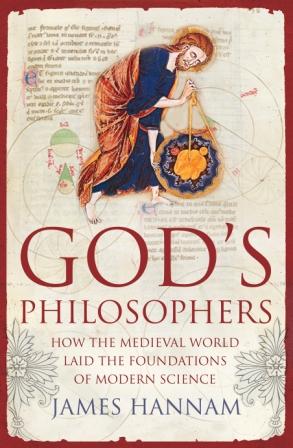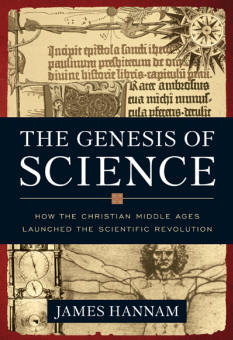
|
If you have enjoyed Bede's Library, you can order my book, The Genesis of Science: How the Christian Middle Ages Launched the Scientific Revolution (US) from Amazon.com or God's Philosophers: How the Medieval World Laid the Foundations of Modern Science (UK) from Amazon.co.uk. |
|
For my latest thoughts on science, politics, religion and history, read Quodlibeta
|
The Effects of Religion on the Modern World
![]()
A review of For the Glory of God
by Rodney Stark, Princeton University Press, 2004
As everyone should know, in logic, a valid argument is one where, if you put
true premises in, you will get a true conclusion out. Less people realise that
you can just as well put rubbish in and still sometimes get a true conclusion.
In other words, just because you get the right answer at the end does not mean
that you have started with the right premises.
Rodney Stark’s book For the Glory of God is a bit like this. Its
conclusions are true but the data that he has used to reach those conclusions
are, in many ways, false. This is unfortunate because the book could have been a
very important work and will, instead, simply be a source of mistakes for anyone
who finds its conclusions way too uncomfortable. Stark is an agnostic of the
sort that thinks religion has played an important and positive roll in human
development. He made his name in the sociology of religion by his detailed and
sympathetic accounts of modern cults which examined their appeal rather than
simply condemning them as evils. Stark quickly realised that these cults were
providing a much needed outlet for religious energy that modern society and even
the mainline churches were finding hard to deal with. People were religious
consumers who made choices about the level of spiritual reward they required and
hence the level of commitment they would tolerate. The more intense cults
provided a much more heady diet than the bland fare more usually on offer and
many people found their palates agreed with this richness.
Next, he stepped back in time and asked about the early growth of Christianity
in The Rise of Christianity. He theorised that it started off as a high
intensity cult that filled a niche in the relatively free religious market of
late antiquity. Using the insights he had gained from modern fringe movements he
described the sociological mechanisms by which Christianity became a major force
in the Roman Empire. Next, in One True God he showed how it was the
nature of any religion that was in position of power to get less intense and
tolerate a far greater compromise with the world. This is exactly what happened
with Christianity which became an arm of a secular state rather than an
outsiders’ religion. He also demonstrated how it was the nature of a
monotheistic religion to become intolerant of rivals and to persecute them once
it had the ability to do so. When there was no threat, a low level of heresy
could be tolerated, but once a threat emerged, toleration was withdrawn even if
the threat in question was unrelated to the heretics. All this sounds like an
excellent argument for the separation of church and state for everyone’s sake.
Both religions and government are better off doing business separately – hence
the much higher level of religious practice in America than Europe. It is
atheists who should be campaigning for the abolition of First Amendment. Luckily
for religious people, few are historically or sociologically savvy enough to
realise this.
In his own field, then, Stark is a brilliant and important figure whose easy
writing style and objective attitude make for exciting reading. But in the book
under review, he starts to tackle a much wider field of issues and asks
very general questions about the effects of religion on society. Lacking the
historical training, familiarity with the primary or secondary literature or a
sound methodology, Stark goes careening of the rails. The book is a valiant
effort but the subject matter is too important to allow it to be expounded in
this gung-ho manner that leaves an army of hostages to fortune. In three
chapters, Stark explains that Christianity was a cause of modern science, witch
trials and the abolition of slavery. This is all completely true and except
among die hard positivists, the second two are not even controversial.
Unfortunately, along the way, he gets so much wrong that said positivists could
spend all day undermining his premises so as never to have to come face to face
with his conclusions.
So, what are the mistakes? It might be best to take one chapter at a time,
starting with the one on science. Stark starts off by having some fun with the
myth of the flat earth and those famous nineteenth
century polemicists who first invented the mythical
conflict between science and religion. This issue is now so well documented
by historians David Lindberg, Jeffrey Burton Russell and Edward Grant that
Stark’s restatement is not presenting anything new. He has combed through a book
by Isaac Asimov, of all people, to determine the religious beliefs of important
early scientists and found they were mainly devout and could be Catholic or
Protestant. Trouble is, his methodology is hopeless when he takes as his sample
a positivistic list of who is important and then declares Paracelsus to be a
sceptic! I suppose he needed to find at least one or two but it is hard to
justify such a label for a mystic. Stark then goes on to say that Christianity
was actually an essential element in modern science and claims this isn’t
controversial either. Well, it is. The conflict hypothesis may be dead in the
water but very few historians are willing to stick their necks out and pronounce
the opposite. Stark’s only witnesses are Alfred North Whitehead in Science
and the Modern World and that does not stand out as a piece of modern
historical argument. Lynn White, Lynn Thorndike, Edward Grant, Toby Huff, John
Henry and Colin Russell might all be able to contribute here but Stark shows
very little knowledge of the literature beyond undergraduate textbooks.
Stark does not seem to be aware that David Lindberg specifically rejects his
thesis on more than one occasion. Important nuances and thinking from Simon
Shapin and Anthony Grafton might also form part of this discussion if a
competent historian were to tackle it. Furthermore, we have almost no primary
sources quoted at all. Given that every medieval and early modern writer on
maths or natural philosophy from Roger Bacon to Francis Bacon and Robert Recorde
to Robert Boyle (to mention only some available in English) can be relied upon
to state that maths is the instrument of God and that the point of astronomy is
to wonder at the maker of the heavens, he was spoilt for choice. Stark is better
on why science failed in Islam, ancient Greece and China (where he produces a
killer quote from Joseph Needham) but this section badly needs input from Huff
and Geoffrey Lloyd.
It gets worse though because Stark then proceeds to the subject of evolution and
produces a train-wreck of an argument that could have come from the most
dyed-in-the-wool Christian fundamentalist. While it is true that you cannot be
too rude about Thomas Huxley, Stark seems to believe that the entire
neo-Darwinian enterprise is a giant plot against religion. Certainly it has been
used as a weapon by militant atheists but I fear Michael Ruse and Kenneth Millar
would have a lot to say about the limitations of this section. For the
positivists it is a god-send though, because by siding with creationists, Stark
torpedoes his own credibility. That is apart from historical howlers like
mentioning Robert Boyle's "limited funds" when the man was actually quite
unfeasibly rich.
Moving on to witches, we have the least bad chapter. It reads like a crib from
Brian Levack’s The Witch Hunt in Early Modern Europe but then so does
everything else written about this for a general audience in the last ten years.
Stark does completely murder Richard Kieckhefer’s research in European Witch
Trials by naively assuming that it includes all witch trials that took place
from 1300 to 1500 rather than just those for which Kieckhefer could find
documentation. But otherwise he allows himself to be guided by competent
authorities so the lack of primary material does not matter much. His major sin
in this chapter is giving his readers the impression he is suggesting a new
theory when is actually says nothing at all original.
Finally we reach the question of slavery. Stark does show some familiarity with
the current literature in asserting that slavery is a more efficient economic
system than wage earning workers. Slavery started because it worked and ended
because societies were willing to make economic sacrifices to abolish it. He
also unearths some interesting papal bulls that show the Catholic Church was
opposed to slavery even if it could not do much about it. This remains largely
unknown, for instance Diarmid MacColluch ignores these bulls in his discussion
of New World slavery in his recent magnum opus Reformation. However,
Stark tries to twist passages from Thomas Aquinas’s Summa Theologica into
an unequivocal condemnation of slavery when it actually does not say this. Not
quoting the passages and giving unclear references in the endnotes give serious
concern that Stark is being altogether too 'whiggish'. While he is right to
point to the Christian Quakers and Methodists as stalwarts against slavery, he
does not explain why the Church of England had no such qualms or quite come to
terms with the New Testament’s highly ambivalent attitude to the question. While
it is true that Christians ended slavery because they were inspired by their
religion, it is more difficult to maintain Christianity was abolitionist per se.
In short, this book is a lost opportunity. It suffers greatly from being written
by a non-historian who is intent on putting only one side of the argument. Those
interested in these topics would be better off reading individual monographs and
should avoid quoting it if they wish there credibility to remain intact in the
choppy waters of argument.
Back to contents
![]()

